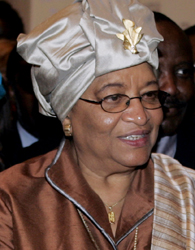In honor of her October 29 birthday, we look at the life and career of longtime politician and economist-in-exile Ellen Johnson-Sirleaf, who became the first elected female president in Africa when she won the 2006 general election in Liberia.
Ellen Johnson-Sirleaf’s Early Days
Ellen Johnson-Sirleaf was born on October 29, 1938, in Monrovia, Liberia. Her heritage is part German and part Gola, an indigenous group of western Liberia. Johnson-Sirleaf’s father was a politician who served on the national legislature. She married James Sirleaf when she was just 17 years old. After completing high school in Liberia, Johnson-Sirleaf went to the United States to further her education. In 1964, she graduated from the University of Wisconsin with an accounting degree; she earned an economics degree at the University of Colorado in 1970; and in 1971, she received a Master’s degree in public administration from Harvard University.
Sources in this Story
- Mt. Holyoke College: Eight Women Around the World: Ellen Johnson-Sirleaf Biography
- PBS Independent Lens: Iron Ladies of Liberia
- Time magazine: Ellen Johnson-Sirleaf
- The New York Times: Struggling but Grateful, Liberia Welcomes Bush
- Nobel Foundation: The Nobel Peace Prize 2011
- The Economist: Praise for the woman who put Liberia back on its feet
Johnson-Sirleaf’s Notable Accomplishments
After graduating from Harvard, Johnson-Sirleaf returned to Liberia to begin her political career. Her first position was assistant minister of finance under President William Tolbert. The growing class divide in Liberia during the 1970s culminated in a military coup in April 1980. Samuel Doe became military dictator of Liberia and executed President Tolbert and several of his staff. Johnson-Sirleaf escaped to Kenya, where she lived in exile during the early 1980s.
Johnson-Sirleaf gained valuable financial experience serving as Director of Citibank in Nairobi. In 1984, the ban on political parties in Liberia was lifted and Johnson-Sirleaf returned to her home country to run for the senate against Samuel Doe’s party in the upcoming election. She was subsequently arrested and sentenced to 10 years in prison. After a short time in jail, Johnson-Sirleaf was again released into exile, which she spent primarily in Kenya. In 1989, Johnson-Sirleaf briefly supported another coup by rebel leader Charles Taylor. The civil war that followed lasted until 1996 and claimed more than 200,000 lives. During this time, Johnson-Sirleaf moved to Washington, D.C., where she worked for the World Bank and the United Nations Development Program Regional Bureau for Africa.
In 1996, the civil war in Liberia ended and Johnson-Sirleaf returned to Liberia to run for president against Charles Taylor. Johnson-Sirleaf lost, earning only 10 % of the popular vote to Taylor’s 75%. Johnson-Sirleaf remained in Liberia as the Unity Party chief. In 1999, civil war again broke out in Liberia, and the conflict continued to escalate until 2003, when Nigerian peacekeepers backed by U.S. Marines brought the war in Liberia to an end. Johnson-Sirleaf served as head of the Governance Reform Commission, resigning in 2005 to run in Liberia’s first postwar presidential election. Johnson-Sirleaf ultimately won the election, defeating soccer star George Weah in a runoff and becoming the first female president in Africa.
The Rest of the Story
Johnson-Sirleaf’s toughness and perseverance have earned her the nickname The Iron Lady. Writing for Time magazine at the time of Johnson-Sirleaf’s inauguration, First Lady Laura Bush said of the Liberian president, “[Her] courage and commitment to her country are an inspiration to me and women around the world.” In 2006, President Johnson-Sirleaf was named one of Forbes magazine’s 100 Most Powerful Women. Johnson-Sirleaf has made significant progress in lobbying for debt relief for Liberia from the International Monetary Fund and the U.S. government. In February 2008, President Bush became the first U.S. president to visit Liberia in more than 30 years.
In 2011, she was awarded the Nobel Peace Prize with Leymah Gbowee and Tawakkol Karman. They received the award “for their non-violent struggle for the safety of women and for women’s rights to full participation in peace-building work.”
Liberia held an election in October 2017 after Johnson-Sirleaf decided to step aside. The Economist noted her successes in rebuilding schools, infrastructure, and getting the country’s debts reduced. Her tenure, however, has not been perfect, as constituents worry about corruption, patronage, and a lack of services. And while much progress has been made in rebuilding the country’s economy, it remains, as of 2017, one of the world’s 10 poorest countries, according to the Economist.
This article was originally written by Caleb March; it was updated October 25, 2017.











